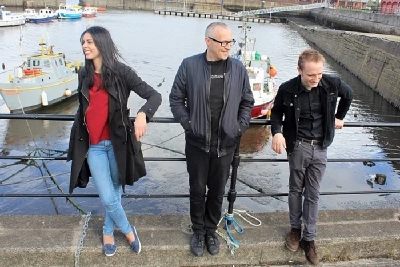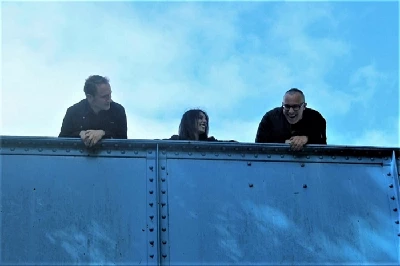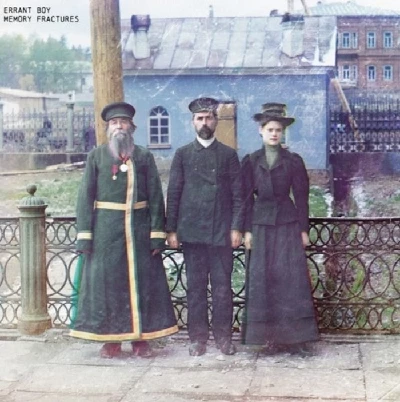published: 24 /
12 /
2018

John Clarkson speaks to Edinbugh-based indie trio Errant Boy about their second album 'Memory Fractures', which they have released digitally and on vinyl.
Article
Errant Boy is a relatively new Edinburgh-based band and was formed in 2015 by Sean Ormsby (vocals/bass/songs) and Chris Harvie (guitar/songs). Ormsby was previously in experimental electronic duo Night NoIse Team who released three albums between 2009 and 2015, while Harvie was in much acclaimed indie pop trio Collar Up, whose second and final album ‘Ghosts’ won a lot of positive press coverage and made ‘The Sunday Herald’ End of the Year poll in 2013.
Errant Boy’s debut album, ‘A Wayward Mirror’, came out in April 2016, and now they have followed this up with a second album, ‘Memory Fractures’, which was released in November and for which they have been joined by drummer Sarrah McLaren.
‘Memory Fractures’, which features on its sleeve an ancient photo of three members of the Russian ruling class taken in 1910, has been released on download and in a limited edition of just a hundred copies on vinyl on the band’s own small label Errant Media.
It breaks new ground for both Ormsby and Harvie, employing for much of it a melodic and lo-fi but often brittle and whiplash guitar sound. Ormsby’s stream-of-consciousness lyrics are pulled from snatches of memory, focusing on day-to-day realities such as sitting on the bus to wild nights out and three-day booze benders to life-changing events such as the birth of children.
‘Means’ opens ‘Memory Fractures’ with a clip of Italian film dialogue before erupting into a jangling pop tune which becomes steadily more dirge-like and sinister. Other highlights on the nine-song ‘Memory Fractures’ include the melancholic, downbeat London-set ‘A Downpour’ in which Ormsby reflects on the loss of innocence that comes with maturity and a lost love affair; the echoing back-and-forth pop of ‘We Like You’ about the cliqueness and the fashion policing of much of the indie scene; and the rumbling riff-driven and catchy ‘444’ about his discovery just as he was about to enter his teens of the Velvet Underground and the Rolling Stones.
Pennyblackmusic spoke to Sean Ormsby, Chris Harvie and latterly Sarrah McLaren about ‘Memory Fractures’.
PB: On your first album you wrote all the songs, but for this new record you and Chris share songwriting credits. How has the songwriting worked on ‘Memory Fractures’? Did you each write particular parts or did it happen in another way?
SEAN ORMSBY: Half of these songs on the new album were written collaboratively. I write the words which can already exist, waiting for a musical home or can be stimulated by melodies, rhythms or riffs. Songs like ‘Means’ and ‘Wine Storm Hurricane’ spring from guitar parts and musical ideas Chris shared with me. This feeling of collaboration then bled into the arrangements, recording, mixing and production.
CHRIS HARVIE: For me it's always about what can be added to a song to improve or enhance it. That can be a guitar part, an effect, recording technique or sometimes nothing. Not being a singer-songwriter, it's a way I've always worked and me and Sean work well together.
PB: The role of the drummer in Errant Boy was initially somewhat revolving, but you found a permanent drummer last year in Sarrah McLaren. How has that changed the dynamics of the group?
SO: The sound has more economy, more space for vocal melodies to breathe now. The band feels more settled to me and the sound we've developed as a trio will hopefully feed into future gigs and songwriting. I think we're really hitting our stride now.
PB: All the lyrics on the album are based on autobiographical snapshots and fragments of memory. Do you see it as a concept album of sorts?
CH: I think every album is a concept to an extent. That's how I grew up listening to music.
SO: Lyrically, there is an element of consistency but you're right. It is fragmented rather than a linear narrative. More like sporadic downpours. But words are only part of the story and I think we've achieved a particular soundworld with this album. Memorable films like ‘Apocalypse Now’ and ‘Blade Runner’ benefit from having their own atmospheres and the same goes for music.
CH: '444’ is a good example of this. The lyric namechecks the Stones and Velvets as escapist figures for the kid hearing them for the first time and I compliment this by emulating Keith Richards' riffs.
PB: Your label mate Stephen McLaren covered similar lyrical territory on his album ‘We Used to Go Raving’ last year. Is that simply down to coincidence or do you see writing soul searching, personally reflective music such as this almost inevitable for the 30-something singer songwriter?
SO: Well, 40-something in my case! Many of the words and ideas reflect a younger self but the finished articles could only happen the way they have now. The perspective is fresh and becomes part of the original experience. As an example, ‘Wine Storm Hurricane ‘stems from a friend becoming a father and explores male tenderness but the finished version reflects my own, more recent, experience of fatherhood.
PB: The opening track ‘Means’ begins with a sample of dialogue from an Italian film. What film was that and why did you decide to use that?
SO: We'd discussed an entry point to the album which would be appropriate and amplify the impact of the weave of guitars and drums that introduce first track ‘Means’. Chris came up with this extract.
CH: The film is ‘La Ragazza con la Valigia ‘and the dialogue translates as "That's living...Well, not really." The song lyric is based in Italy and the sample seemed appropriate.
SO: It also recognises our shared love of 50s/60s new wave European films. An indication that the band's aesthetic is informed by influences other than just pop music. Something which often gets overlooked in reviews/appreciation of any musical concern.
PB: The front cover art is based on a 1910 photo by Sergei Prokudin Gorskii. What was the appeal to you of that photo and why did you decide to want t to use it on your sleeve?
SO: Firstly, the image made me smile and then intrigued me. It seemed to fit the album in so many ways. The band is a trio of differing ages for a start (some people are convinced it's a photo-shopped picture of Errant Boy). It also brought to mind a line from ‘444’ - "So pleased to be leaving this hideous century.".These three Russians posing for the camera, unaware of the imminent First World War, October Revolution and general upheaval to follow. I also realised the photo was like many of the album's lyrics: memories consigned to history, waiting to be picked up, used and revised by strangers. And me.
PB: The reviews for ‘Memory Fractures’ have all been very favourable so far, but several critics have pointed out that it is an album that you have to listen to a few times to really appreciate its depths. Was that what you were aiming for when you were writing and recording it?
SO: Definitely. I'm suspicious of anything revealing itself straight away. That probably goes for people too. Lyrically, the imagery is there to be unpicked.
CH: Instrumentally the tracks are carefully layered and mixed to this end. The melodies and production are punchy to draw you in.
PB: ‘Memory Fractures’ was ”made in Leith” in Edinburgh. You are all based there. Was the album recorded at home and like its predecessor largely at ‘Errant Mansions’. Why did you decide to record it there rather than go into a regular recording studio? In what way do you think that benefitted the recording?
CH: This DIY approach to making music means you can take advantage of a kind of spontaneity. You can take time to work on tracks. Often, as you do this, other possibilities then occur and recordings develop without financial stress. This album was made at home but also in various rehearsal studios and at a friend's studio.
SO: Also, you can control the sound and direction of the tracks which is important for us at the moment. Not being "on the clock" means you can record, listen back and mix whenever you get a chance or feel inspired.
PB: ‘Memory Fractures’ has been released on download and limited edition vinyl. Why did you decide not to do a CD edition?
SO: This was discussed at length. How music is consumed is currently mysterious to me and we discovered that it's very much down to who you ask. The reasons are financial, aesthetic and pragmatic. Less anti-CD and more pro-vinyl. Somewhere along the line, we agreed this album deserved vinyl. A concept not everyone gets but absolutely the right decision.
CH: I don't have a CD player!
SO: That was the winning argument!
PB: You have just played launch nights for ‘Memory Fractures’ in Glasgow and Edinburgh. What does Errant Boy have planned for the near future?
CH: Start demoing new songs. Play more gigs and sell some vinyl!
SARRAH MCLAREN: I’ve really enjoyed being part of the band over the last year, so I’m looking for-ward to much of the same: the laughs in and out the practice room; playing more gigs in 2019; and hopefully continuing the buzz that’s around at the moment.
PB: Thank you.
Band Links:-
https://www.facebook.com/errantboy/
https://twitter.com/errantmedia
Picture Gallery:-

